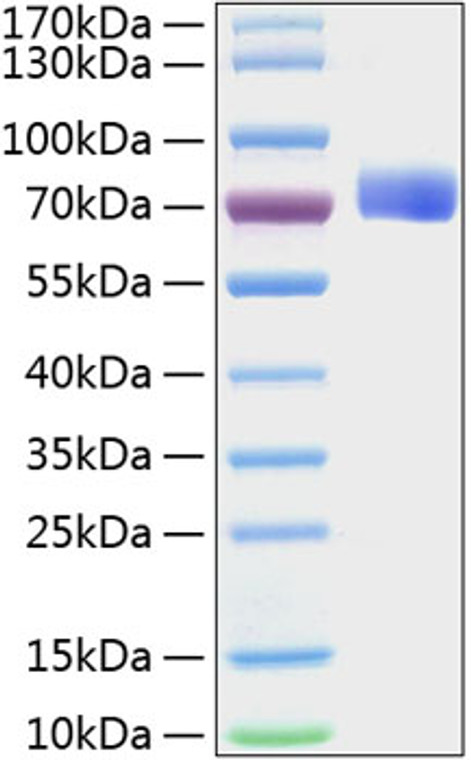| Host: |
HEK293 cells |
| Reactivity: |
Mouse |
| Note: |
STRICTLY FOR FURTHER SCIENTIFIC RESEARCH USE ONLY (RUO). MUST NOT TO BE USED IN DIAGNOSTIC OR THERAPEUTIC APPLICATIONS. |
| Short Description: |
Recombinant-Mouse EphB2-C-His protein was developed from hek293 cells and has a target region of C-His. For use in research applications. |
| Formulation: |
Lyophilized from a 0.22 Mu m filtered solution of PBS, pH 7.4. Contact us for customized product form or formulation. |
| Immunoreactivity: |
Measured by its binding ability in a functional ELISA. Immobilized Mouse EphB2 at 2 Mu g/mL (100 Mu L/well) can bind Mouse Ephrin B2 with a linear range of 0.12-0.92 ng/mL. |
| Gene Symbol: |
Ephb2 |
| Gene ID: |
13844 |
| Uniprot ID: |
EPHB2_MOUSE |
| Immunogen Region: |
Met1-Lys540 |
| Immunogen: |
Recombinant Mouse EphB2 Protein is produced by HEK293 cells expression system. The target protein is expressed with sequence (Met1-Lys540) of mouse EphB2 (Accession #NP_034272.1) fused with a 6×His tag at the C-terminus. |
| Tissue Specificity | Expressed in the epithelial dark cells of the inner ear. Expressed in the region of the proximal tubules of the kidney nephron. Expressed in myogenic progenitor cells. |
| Post Translational Modifications | Autophosphorylated.ligand binding stimulates autophosphorylation on tyrosine residues. Ligand binding induces cleavage by matrix metalloproteinases (MMPs) such as MMP7/MMP9, producing an EphB2/N-terminal fragment (NTF) and a C-terminal long fragment (EphB2-LF). EphB2-LF is further cleaved by MMPs, producing EphB2/CTF1 which is further cleaved by the PS1/gamma-secretase producing EphB2/CTF2. Polyubiquitinated.ligand binding stimulates ubiquitination. Ubiquitinated by RNF186 at Lys-891, mainly through 'Lys-27'-linked polyubiquitin chains. |
| Function | Receptor tyrosine kinase which binds promiscuously transmembrane ephrin-B family ligands residing on adjacent cells, leading to contact-dependent bidirectional signaling into neighboring cells. The signaling pathway downstream of the receptor is referred to as forward signaling while the signaling pathway downstream of the ephrin ligand is referred to as reverse signaling. Functions in axon guidance during development. Involved in the guidance of commissural axons, that form a major interhemispheric connection between the 2 temporal lobes of the cerebral cortex. Also involved in guidance of contralateral inner ear efferent growth cones at the midline and of retinal ganglion cell axons to the optic disk. In addition to axon guidance, also regulates dendritic spines development and maturation and stimulates the formation of excitatory synapses. Upon activation by EFNB1, abolishes the ARHGEF15-mediated negative regulation on excitatory synapse formation. Controls other aspects of development including angiogenesis, palate development and in inner ear development through regulation of endolymph production. Forward and reverse signaling through the EFNB2/EPHB2 complex regulate movement and adhesion of cells that tubularize the urethra and septate the cloaca. May function as a tumor suppressor. May be involved in the regulation of platelet activation and blood coagulation. |
| Protein Name | Ephrin Type-B Receptor 2Neural KinaseNuk Receptor Tyrosine KinaseTyrosine-Protein Kinase Receptor Eph-3Tyrosine-Protein Kinase Receptor Sek-3 Cleaved Into - Ephb2/Ctf1 - Ephb2/Ctf2 |
| Database Links | Reactome: R-MMU-2682334Reactome: -MMU-3928662Reactome: -MMU-3928664Reactome: -MMU-3928665 |
| Cellular Localisation | Cell MembraneSingle-Pass Type I Membrane ProteinCell ProjectionAxonDendrite |
| Alternative Protein Names | Ephrin Type-B Receptor 2 proteinNeural Kinase proteinNuk Receptor Tyrosine Kinase proteinTyrosine-Protein Kinase Receptor Eph-3 proteinTyrosine-Protein Kinase Receptor Sek-3 Cleaved Into - Ephb2/Ctf1 - Ephb2/Ctf2 proteinEphb2 proteinEpth3 proteinNuk proteinSek3 protein |
Information sourced from Uniprot.org
12 months for antibodies. 6 months for ELISA Kits. Please see website T&Cs for further guidance









